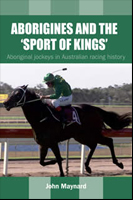Aborigines and the 'Sport of Kings': Aboriginal jockeys in Australian racing history (Third edition)
Summary
Coming from an Aboriginal family involved in racing, John Maynard has always know there have been more Aboriginal jockeys contributing to Australian racing than is generally known. In Aborigines and the ‘Sport of Kings’ he combines his skills as a researcher and historian with his deep knowledge of Australian racing.
In this revised edition he celebrates the significant and exciting Aboriginal involvement in Australian racing history. For Aboriginal pastoral workers to move from being the backbone of the pastoral industry to being superb jockeys was an obvious step.
Amongst the many Aboriginal jockeys highlighted in the book are Merv Maynard, Norm Rose, Frank Reys, Richard Lawrence 'Darby' McCarthy and Leigh-Anne Goodwin, Australia's first female Aboriginal jockey to ride a winner at a metropolitan track.
Published formerly as Aboriginal stars of the turf.
Professor John Maynard is one of the most prolific and respected voices writing about Aboriginal history. He has won awards, is in demand as a speaker and as an advisor for television programs. He is Professor of Aboriginal Studies, Newcastle University, and currently an ARC research fellow. His most recent publication is The Aboriginal soccer tribe (Magabala) while his previous publications with Aboriginal Studies Press include popular Fight for liberty and freedom and he was also a contributor to Uncommon ground.
Endorsements
Australia has two histories, one that belongs to European Australians and the other which belongs to the original Indigenous inhabitants of this land. But from 1788 those histories also became intertwined as Aboriginal people learnt to adapt to European society, even as they continued to resist it. They excelled as shepherds, shearers (when permitted), stockriders, and entertainers (especially as circus performers). They also proved to be outstanding jockeys, something that sporting journalists as well as cultural historians seem to have forgotten. This outstanding book is a case study in survival and achievement in the face of adversity.
— from the foreword by Richard Waterhouse
